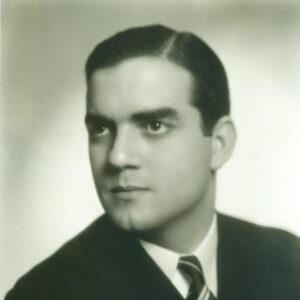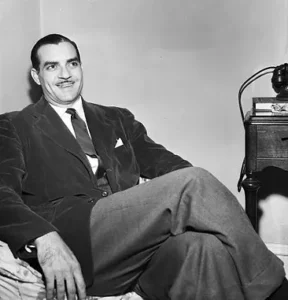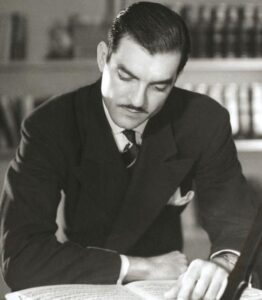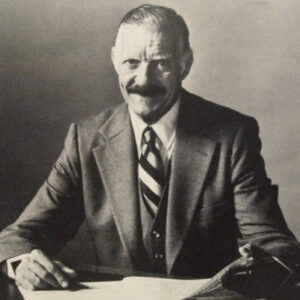Celebrating Hispanic Heritage: Jorge Bolet (Piano '40)

 Born in Havana, Cuba, on November 15, 1914, prize-winning virtuoso pianist, conductor, teacher, and Curtis alumnus Jorge Bolet‘s (Piano ’40) rise to fame came unusually late in life—he did not achieve international renown until his ’60s. In 1927, at age 12, the young Bolet was sent to the United States to study with David Saperton, Leopold Godowsky, Moriz Rosenthal, and Josef Hofmann at Curtis. While at the school, he served as the assistant of pianist Rudolf Serkin and, after winning the Naumburg Award in 1937, presented his New York debut recital at the Town Hall. A year later, in 1938, he received the prestigious Josef Hofmann Award.
Born in Havana, Cuba, on November 15, 1914, prize-winning virtuoso pianist, conductor, teacher, and Curtis alumnus Jorge Bolet‘s (Piano ’40) rise to fame came unusually late in life—he did not achieve international renown until his ’60s. In 1927, at age 12, the young Bolet was sent to the United States to study with David Saperton, Leopold Godowsky, Moriz Rosenthal, and Josef Hofmann at Curtis. While at the school, he served as the assistant of pianist Rudolf Serkin and, after winning the Naumburg Award in 1937, presented his New York debut recital at the Town Hall. A year later, in 1938, he received the prestigious Josef Hofmann Award.
 In 1942, Mr. Bolet joined the U.S. Army and was sent to Japan to serve. While there, he conducted the Japanese premiere of Gilbert and Sullivan’s operetta, The Mikado. After returning to the U.S., he began taking private lessons with Abram Chasins (Piano ’29), supporting Mr. Bolet in his somewhat frustrating endeavor to establish himself as a concert pianist of note. During the 1950s, he made his first recordings of recitals for the Boston and Remington labels, most notably the Piano Concerto No. 2 Op. 16 of Sergei Prokofiev with the Cincinnati Symphony Orchestra and the Four Scherzi of Frederic Chopin. In 1960, he played the piano soundtrack for the 1950 biopic of Franz Liszt, Song Without End, starring Dirk Bogarde and Genevieve Page.
In 1942, Mr. Bolet joined the U.S. Army and was sent to Japan to serve. While there, he conducted the Japanese premiere of Gilbert and Sullivan’s operetta, The Mikado. After returning to the U.S., he began taking private lessons with Abram Chasins (Piano ’29), supporting Mr. Bolet in his somewhat frustrating endeavor to establish himself as a concert pianist of note. During the 1950s, he made his first recordings of recitals for the Boston and Remington labels, most notably the Piano Concerto No. 2 Op. 16 of Sergei Prokofiev with the Cincinnati Symphony Orchestra and the Four Scherzi of Frederic Chopin. In 1960, he played the piano soundtrack for the 1950 biopic of Franz Liszt, Song Without End, starring Dirk Bogarde and Genevieve Page.

Regarding his private life, Mr. Bolet and his partner Houston Larimore “Tex” Compton met in the early 1940s after Tex financially invested in Jorge’s performance career, forming the Arcoiris Corp. Mr. Compton even traveled with his partner as his road manager and secretary and by 1951, the couple were both residing at 71 Washington Square in New York City. In 1980, after nearly forty years together, Tex died in Santa Clara, southeast of San Francisco.
A 1983 interview of pianist Jorge Bolet by Robin Ray.
 In a musical climate that derided anti-Romantics for decades, Mr. Bolet was largely ignored until the 1970s, when a wave of neo-Romanticism shifted the tides in his favor, leading to widespread acclaim and up to 150 concert appearances a year. Beginning in 1978 at age 64, he was contracted by Decca/London Records to record a series of albums featuring the work of Franz Liszt, Frédéric Chopin, Johannes Brahms, Robert Schumann, and Sergei Rachmaninoff, the French music of César Franck and Claude Debussy, and various encore pieces. According to a memorial article in the New York Times, he “was one of the few pianists to record the Godowsky arrangements of the Chopin Etudes; these Godowsky transcriptions may be the most difficult pieces ever written for solo piano.” In 1984, Mr. Bolet gave a series of masterclasses entitled Bolet Meets Rachmaninoff, broadcast through the A&E Network, accompanied by a complete performance of the composer’s Piano Concerto No. 3.
In a musical climate that derided anti-Romantics for decades, Mr. Bolet was largely ignored until the 1970s, when a wave of neo-Romanticism shifted the tides in his favor, leading to widespread acclaim and up to 150 concert appearances a year. Beginning in 1978 at age 64, he was contracted by Decca/London Records to record a series of albums featuring the work of Franz Liszt, Frédéric Chopin, Johannes Brahms, Robert Schumann, and Sergei Rachmaninoff, the French music of César Franck and Claude Debussy, and various encore pieces. According to a memorial article in the New York Times, he “was one of the few pianists to record the Godowsky arrangements of the Chopin Etudes; these Godowsky transcriptions may be the most difficult pieces ever written for solo piano.” In 1984, Mr. Bolet gave a series of masterclasses entitled Bolet Meets Rachmaninoff, broadcast through the A&E Network, accompanied by a complete performance of the composer’s Piano Concerto No. 3.
Bolet Meets Rachmaninoff: Jorge Bolet masterclass excerpt from the A&E Network.
Prior to and during his international performance career, Mr. Bolet served as professor of piano music at Indiana University from 1968 to 1977. He became head of the piano department at Curtis in 1977, succeeding Mr. Serkin, until 1986. Upon his appointment, he said, ”I have received knowledge and experience from the great masters, and it is now my responsibility to pass it on to the next generation.”
Mr. Bolet passed away on October 16, 1990, at age 75, in Mountain View, California.
Explore more Curtis history at the Curtis Institute of Music Open Archives and Recitals (CIMOAR) digital collections. Learn more about Curtis’s library and archives HERE.
Photo Credits: 1.) Banner image courtesy of Bach-Cantatas.com. 2. Image courtesy of the Curtis Institute of Music Library and Archives. 3.) Jorge Bolet promo image at Texas Christian University’s Ed Landreth Auditorium; Fort Worth Star-Telegram, morning edition, November 3, 1950. 4, 5.) Courtesy of the official Eugene Isotmin website.


